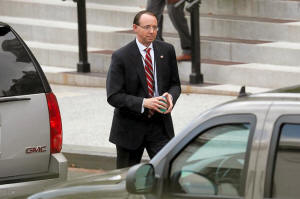|
After chaotic day, Rosenstein stays in
job but will meet with Trump
 Send a link to a friend
Send a link to a friend
 [September 25, 2018]
By Karen Freifeld and Sarah N. Lynch [September 25, 2018]
By Karen Freifeld and Sarah N. Lynch
WASHINGTON (Reuters) - President Donald
Trump and U.S. Deputy Attorney General Rod Rosenstein, who oversees the
special counsel investigation into Russia's role in the 2016
presidential election, will meet on Thursday to discuss whether
Rosenstein will stay in his job.
Rosenstein had spent the weekend contemplating whether he should resign
after a New York Times report last week said he had suggested secretly
recording Trump in 2017, a source told Reuters.
The White House announced the meeting on Monday after a flurry of
conflicting media reports about whether Rosenstein, a frequent target of
Trump's anger, would be leaving the post.
"At the request of Deputy Attorney General Rod Rosenstein, he and
President Trump had an extended conversation to discuss the recent news
stories," White House spokeswoman Sarah Sanders said on Twitter.
Trump, who is in New York for the U.N. General Assembly, told reporters
he would meet with Rosenstein on Thursday when he returns to Washington.
"We'll be meeting at the White House and we'll be determining what's
going on," Trump said. "We want to have transparency, we want to have
openness, and I look forward to meeting with Rod at that time."

The Rosenstein furor, kicked off by unconfirmed reports that he had
verbally resigned, underscored the mounting tension in the White House
over the investigation by special counsel Robert Mueller into Russia's
role in the 2016 presidential election.
There had been widespread speculation that Trump would fire Rosenstein
since Friday when a New York Times report said that in 2017 Rosenstein
had suggested secretly recording the president and recruiting Cabinet
members to invoke a constitutional amendment to remove him from office.
The Times said none of those proposals came to fruition. Rosenstein
denied the report as "inaccurate and factually incorrect."
Shortly after the Times story, Trump told supporters at a rally in
Missouri that there is "a lingering stench" at the Justice Department
and that "we’re going to get rid of that, too."
FATE OF INVESTIGATION
Rosenstein's departure would prompt questions about the future of
Mueller's investigation and whether Trump, who has called the probe a
"witch hunt," would seek to remove Mueller. The investigation has
resulted in indictments or guilty pleas from 32 people.
The Rosenstein furor came just six weeks ahead of the Nov. 6
congressional elections, and his removal could become an explosive
political issue as Trump's fellow Republicans try to keep control of
Congress.
Thursday's meeting between Trump and Rosenstein is set for the same day
that Trump's Supreme Court nominee, Brett Kavanaugh, and the woman who
has accused him of sexual misconduct are scheduled to testify at a
Senate hearing.
If Rosenstein resigns, Trump has more leeway on replacing him while
firing him would make it harder for Trump to designate a successor.

[to top of second column]
|

U.S. Deputy Attorney General Rod Rosenstein departs the West Wing of
the White House after a meeting on FBI investigations into the 2016
Trump presidential campaign with U.S. President Donald Trump at the
White House in Washington, U.S., May 21, 2018. REUTERS/Leah
Millis/File Photo

Rosenstein's future ignited a series of conflicting reports on
Monday, with the Axios news website cited an unidentified source
with knowledge of the matter as saying he had verbally resigned to
White House Chief of Staff John Kelly. Other reports said Rosenstein
expected to be fired while NBC News reported Rosenstein said he
would not resign and the White House would have to fire him.
U.S. Treasury yields fell as much as 2 basis points after the Axios
report, signaling investor concern but later pared losses. The S&P
500 also ticked down briefly but recovered most of its losses.
Rosenstein has defended Mueller and been a target of Trump since he
assumed supervision of the Russia investigation after his boss,
Attorney General Jeff Sessions, recused himself because of his own
contacts with Russia's ambassador to Washington while serving as a
Trump campaign adviser became public.
Trump also has blasted Sessions frequently and said last week "I
don't have an attorney general."
Former FBI Deputy Director Andrew McCabe said he was "deeply
concerned" about the reports of Rosenstein stepping down, saying his
departure would put the federal probe into Russian election
activities at risk.

"There is nothing more important to the integrity of law enforcement
and the rule of law than protecting the investigation of Special
Counsel (Robert) Mueller," McCabe said in a statement.
McCabe was fired by Sessions in March after the Justice Department's
internal watchdog accused him of misconduct. McCabe charged that he
was targeted for being a witness into whether Trump tried to
obstruct the probe into alleged Russian meddling in the 2016
presidential election.
Rosenstein served for 12 years as the chief federal prosecutor in
Maryland under both Democratic and Republican presidents before
becoming deputy attorney general in April 2017.
Trump appointed him after firing Sally Yates, who served as deputy
attorney general under Democratic former President Barack Obama and
as acting attorney general under Trump. He dismissed her 10 days
after taking office, after she refused to defend his executive order
banning people from several Muslim-majority countries from entering
the United States.
(Additional reporting by Doina Chiacu and Susan Heavey in Washington
and Jeff Mason in New York; Writing by John Whitesides; Editing by
Bill Rigby and Bill Trott)
[© 2018 Thomson Reuters. All rights
reserved.]
Copyright 2018 Reuters. All rights reserved. This material may not be published,
broadcast, rewritten or redistributed.
Thompson Reuters is solely responsible for this content. |